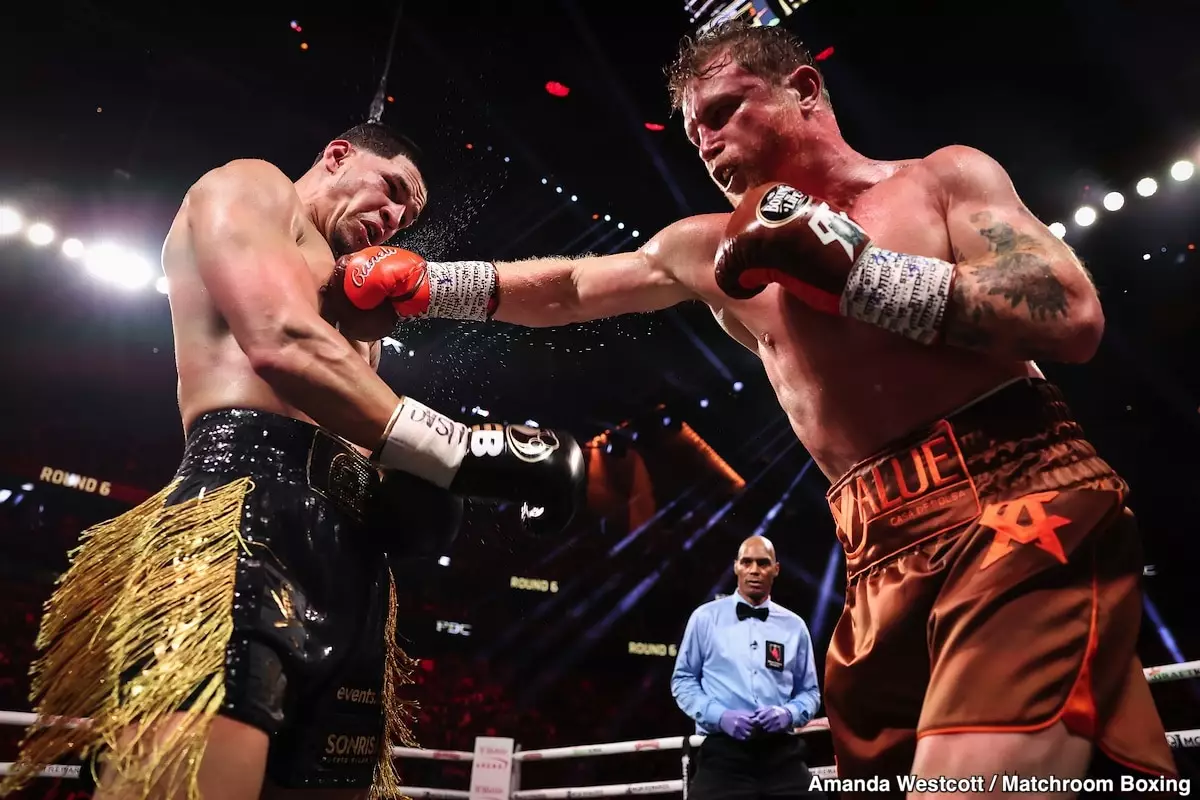The world of boxing is no stranger to rivalries, personal critiques, and heated discussions over athletes’ performances, especially when it comes to high-profile fighters like Canelo Alvarez. Recently, Oscar De La Hoya turned the spotlight on Alvarez and his performance against Edgar Berlanga, which took place at the T-Mobile Arena in Las Vegas. De La Hoya’s comments during his ‘Clap Back Thursdays’ series brought forth not only a critique of Canelo but also a broader conversation about the direction of boxing today.
The Arena Debacle: Attendance Issues and Match Expectations
De La Hoya wasted no time in expressing his satisfaction with the lack of a sellout for the Canelo vs. Berlanga event, asserting his pre-fight prediction had been correct. The T-Mobile Arena, which can accommodate a sizable gathering, had noticeable empty sections on fight night. Such circumstances raise eyebrows and indicate a disconnect between the fighter’s draw and the fans’ enthusiasm. There were reports of half-hearted attempts at marketing the fight, suggesting that perhaps Canelo’s appeal as a marquee fighter is fading if he struggles to sell out a major venue. De La Hoya’s comments serve as a wake-up call: boxing desperately needs to return to exciting matchups that can captivate audiences, rather than relying solely on big names to fill seats.
What exacerbates the attendance problem, according to De La Hoya, is the nature of the fight itself. Despite Canelo’s victory, the bout failed to showcase any thrilling moments or a decisive knockout—something many fans of the sport expect from a fighter of his caliber. De La Hoya’s criticism of the fight as being devoid of excitement is an important critique, suggesting that boxing has seen a decline in fighters actually seeking to finish their opponents. Canelo managed to land some impressive shots during the fight, but the predominant narrative turned toward the fact that Berlanga seemed content to survive rather than compete robustly, a sentiment that further evidences the retrograde trend in boxing.
The Era of Survivor Fights
In a sport known for its history of titanic clashes, fans expect not just endurance but also aggression and the desire to win. De La Hoya’s observation that fighters are now being praised for merely going the distance, rather than for their ability to secure a knockout or display tactical prowess, reveals a lack of ambition among boxers today. The standard has evidently shifted. Winning a fight by decision, especially against an opponent who was competitive in stature but not skill, has become an acceptable outcome, and that raises questions about the current mentality of fighters.
De La Hoya pointed out an essential aspect of a champion’s mentality versus the current mindset that seems more concerned with securing a paycheck than establishing boxing greatness. Canelo’s cautious approach in the ring speaks to a broader trend whereby fighters aim to protect their records and avoid high-risk bouts, instead opting for safer, less challenging opponents. In the case of Canelo, De La Hoya suggests that the ultimate ambition might no longer be about making history but rather about maintaining an image, a point evidenced by the reluctance to engage with top contenders like David Benavidez or Dmitry Bivol.
The choices made by Canelo raise essential questions about the legacy he wishes to leave. De La Hoya’s recollections of past fighters showcase a contrasting era; one focused on grit, resilience, and the pursuit of greatness through fighting the best available competition. By comparing their mentalities, it becomes clear that the atmosphere surrounding boxing has shifted, calling into question whether current athletes have the same hunger for achievement that previous generations once exhibited.
The Future of Boxing: A Call for Reinvigoration
As the boxing community absorbs De La Hoya’s critique, the implications extend well beyond a single fight. The conversation emphasizes a shared desire among fans for more compelling matchups that involve the sport’s most formidable talents. If boxing hopes to recapture the attention and passion of its audience, it must nurture an environment where champions challenge themselves and fight to establish their dominance and legacy.
Ultimately, Oscar De La Hoya’s comments on Canelo Alvarez serve as a crucial commentary on the sport’s current affairs. To elevate boxing from its recent stagnation, both fans and fighters need to advocate for higher standards and more engaging contests, ensuring that tomorrow’s champions don’t simply survive but thrive on the path to greatness.

